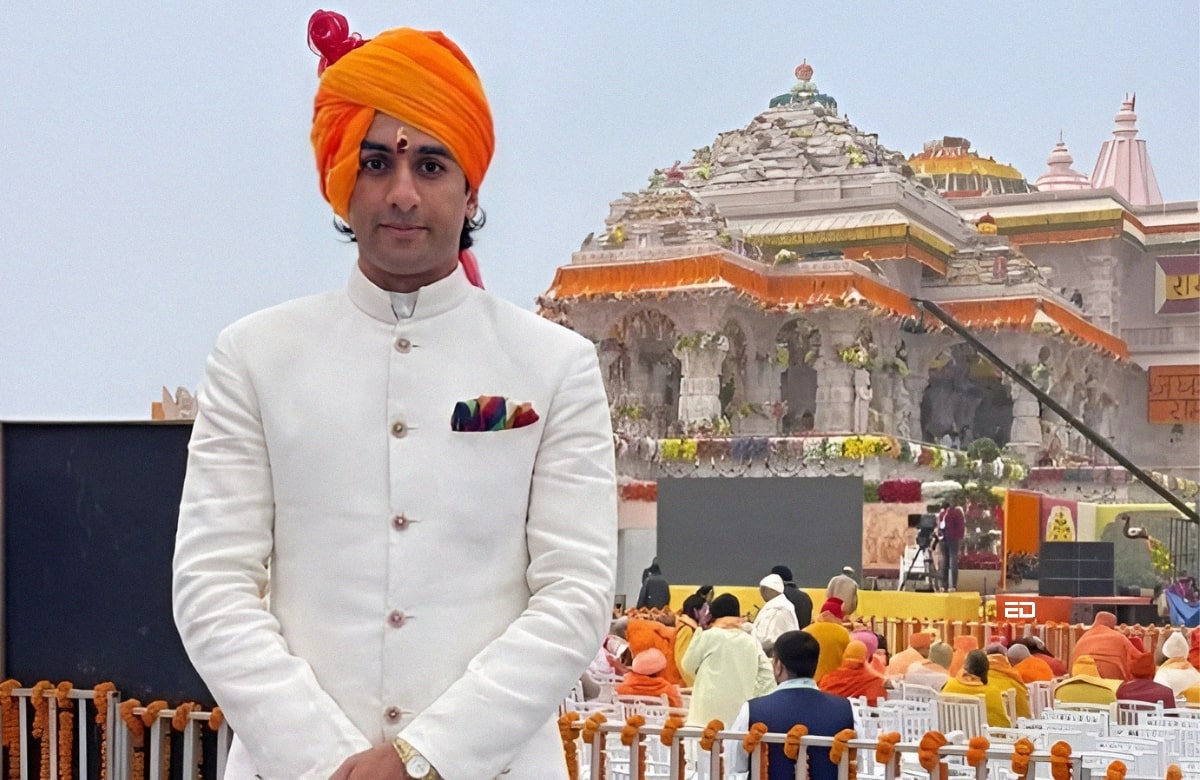In the heart of Ayodhya, where the sacred Ram Temple stands as a symbol of reverence and devotion, a new chapter in the narrative of Lord Ram unfolds. Maharaja Sawai Padmanabh Singh of Jaipur, representing the esteemed Suryavanshi Rajputs, recently took to social media to share an extraordinary claim that has ignited conversations across platforms.
With the consecration of the idol of Ram Lalla as the backdrop, Maharaja Padmanabh Singh presented a captivating assertion of a familial link to Lord Ram, supported by a meticulously preserved ancestral scroll and an 18th-century cloth map of Ayodhya.
The Ancestral Scroll
Behind the claim is a Vanshavali, an ancestral scroll meticulously preserved by the Suryavanshi Rajputs for generations. According to Maharaja Padmanabh Singh, the scroll traces their lineage back an astonishing 309 generations, connecting them to the revered Lord Ram.
The social media post, which has garnered over 30,000 likes, prompted users to express gratitude for the revelation of names of ancestors and descendants of Lord Ram, highlighting the profound interest and respect for the historical significance of such claims.
The Historic Map of Ayodhya
Adding a tangible layer to their asserted ancestry is an 18th-century cloth map of Ayodhya. Maharaja Sawai Jai Singh II, the ancestor of Maharaja Padmanabh Singh, acquired this historic artifact from a saint. The map, a tangible link to their historical connection, not only serves as a valuable historical document but also provides a visual representation of Ayodhya’s landscape from centuries ago. Its preservation by the royal family further underscores the importance they place on their historical roots.
Read More: In Pics: 5 Crazy Facts About Ayodhya’s Ram Mandir
Historian R Nath’s Validation
In a compelling addition to this historical narrative, historian R Nath’s research provides concrete evidence supporting the royal family’s claim. According to Annexure-2 of Nath’s acclaimed work, The Jai Singhpura of Sawai Raja Jai Singh at Ayodhya, the Kachhwaha dynasty of Jaipur indeed had rights over the Ram Mandir in Ayodhya.
Documents from the research book ‘Studies in the Middle Indian Architecture’ affirm that Kot Ram’s birthplace in Ayodhya was under the authority of Sawai Jai Singh II. Leases and numerous secure documents further validate the historical connection.
Jaisinghpur: Birthplace of Lord Ram
Historian R Nath claims that the birthplace of Lord Ram is in Jaisinghpur, a land acquired by Sawai Jai Singh II in 1727 after the death of Emperor Aurangzeb. The fort in this region, built at a height of about 40 feet off the coast of Ramchandrapura Saryu, underwent significant renovations by Sawai Jai Singh II. Between 1717 and 1725, the Ram Janmabhoomi Temple in Ayodhya was constructed, with the work carried out meticulously according to Hindu scriptures.
The conjunction of the royal family’s ancestral scroll, historic maps, and the historical validation provided by historian R Nath weaves a compelling narrative of the Suryavanshi Rajputs’ connection to Lord Ram. As we delve deeper into these historical accounts, the story gains not only fascination but also credibility.
Maharaja Sawai Padmanabh Singh’s claim, enriched by historical artifacts and validated by scholarly research, adds a captivating layer to the enduring legacy of Lord Ram and the intricate tapestry of Indian cultural history.
Image Credits: Google Images
Sources: Times of India, NDTV, Times Now
Find the blogger: Pragya Damani
This post is tagged under: Ayodhya, Ram Temple, Suryavanshi Rajputs, Maharaja Sawai Padmanabh Singh, Ancestral Scroll, Historical Maps, R Nath, Jaisinghpur, Royal Lineage, Hindu Heritage, Historical Validation, Lord Ram, Cultural History, Indian Royalty, Heritage Preservation, Vanshavali, Social Media, Historical Claims, Religious Heritage, Maharaja Sawai Jai Singh II
Disclaimer: We do not hold any right, copyright over any of the images used, these have been taken from Google. In case of credits or removal, the owner may kindly mail us.
Other Recommendations:
ED VOXPOP: WE ASKED INDIAN GENZ WHAT THEY THOUGHT OF THE ISRAEL-HAMAS WAR































